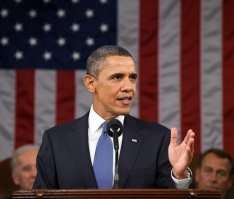5 Big Problems Obama Will Ignore in His State of the Union Address
What President Obama says in his 2013 State of the Union Address isn't as important as what he leaves out.

President Barack Obama will present the first State of the Union address of his second term this evening. He has already told House Democrats that the focus of the speech will be on jobs and the economy, but according to USA Today, he is also expected to discuss gun control, climate change, and immigration.
In other words, the State of the Union address will probably sound a lot like every other speech the president has given. If your State of the Union drinking game doesn't include the phrase "common-sense solutions," you're probably some sort of teetotaler.
If you're among the 88 percent of Americans who won't bother to tune in (according to Nielsen ratings of last year's audience), don't worry: It's not like the president will actually discuss the real state of the country. Rather it's yet another chance for Obama to promote his own policies and ignore their many flaws. Sen. Marco Rubio (R-Fla.), on behalf of the GOP, and Sen. Rand Paul (R-Ky.), on behalf of the Tea Party, will provide responses that will hopefully point out the president's attempts to dodge reality. But if not, we've got a handy list of issues the president is likely to avoid in the State of the Union address.
1. About that Fiscal Cliff
The president is likely to call for broadening the tax base and "closing loopholes," and to criticize Republicans for trying to throw Grandma out into the cold rather than get more tax money from the rich. In his weekend radio address, Obama said the Republican plan to avoid automatic spending cuts "puts the burdens on seniors and middle class families." He also claims that we have made "good progress" in reducing the deficit for the last two years.
The Reality
No, actually, there have been no spending cuts and there has been no deficit reduction. As Reason.com columnist A. Barton Hinkle has explained, what the government defines as cuts is often reducing the amount of growth of future spending, eliminating proposed parts of future budgets. It's not spending less money from year to year, as you and I would describe a spending cut. Rather it's eliminating theoretical future spending. Federal spending has jumped from $1.77 trillion in fiscal year 2000 to $3.72 trillion in fiscal year 2010. And while Obama says the Republicans have refused to accept closing any tax loopholes for the rich, Republicans have shot back that the president actually refuses to accept any spending cuts as part of the fiscal cliff negotiations.
2. About that Sequester

The president's Saturday radio address warned of dire consequences should the sequester happen, cutting $85 billion from the federal budget for the next year. He said thousands of Americans are "likely to be laid off" if Congress fails to stop the sequestration cuts. He also argued (no doubt in an effort to get hawkish conservatives on board) that sequestration would threaten our military readiness.
The Reality
Not bloody likely. Mercatus Center analyst and Reason economics columnist Veronique de Rugy crunched the defense numbers and noted that even after dipping slightly next year due to the sequestration, the defense budget will still continue to grow and grow fairly constantly for the next 10 years following that one dip.
George Mason University economics professor Tyler Cowen noted in a New York Times piece that while the job losses in the defense industry might lower our gross domestic product in the short term, in the long term we may well be better off because it "would most likely mean fewer engineers and scientists inventing weaponry and more of them producing for consumers." Military spending does not generally produce real wealth as we see it. Shifting employment out of that industry might ultimately benefit our economic growth in the long run.
3. About that Gun Control

The Sandy Hook tragedy is the impetus for a host of new gun control proposals, including national background checks for all gun buyers, the reinstatement of the ban on assault weapons (whatever the heck those are), limiting the capacity of gun magazines, and millions more in government spending and grants to help communities develop "response plans." He will undoubtedly push his proposal at the State of the Union address while insisting that he is not calling for taking guns away from Americans and that there is a "consensus" supporting his proposals.
The Reality
The latest Reason-Rupe Public Opinion Poll shows that a majority of Americans support the right for individuals to own assault weapons by a 51 to 44 percent margin (though the wording of the question matters). The market seems to agree, as the possibility of future restrictions on purchases have driven up gun sales.
In defense of reinstating the assault weapons ban, Vice President Joe Biden took to the pages of USA Today to claim that fewer police were being shot when assault weapons were banned. Reason Contributing Editor Radley Balko examined the numbers and determined the claim was a lie. The statistics of cop deaths during the 10 years of the assault weapons ban did not show any such thing. In fact, assault weapons are used in a very small percentage of weapons-related crimes.
There is little evidence that any national federal policy would be effective in preventing extremely unusual cases like Adam Lanza's. 2012 was a bad year for mass shootings in America, but it came after a decline in such shootings reaching all the way back to 1999. Reason's Jesse Walker took note in January that what we think of as "crime waves" are actually typically waves of increased media attention to related violence (note how every potential incidence of school violence is getting much more media attention). Whatever "common sense" policies the Obama administration may put forward will likely ignore that those policies would have not done anything to actually prevent the Sandy Hook shooting.
4. About Leaving Afghanistan

The president will no doubt mention bringing the troops home from Afghanistan (if you ignore the "residual force" he wants to leave behind). In a news conference with Afghan President Hamid Karzai in January Obama said, "By the end of 2014, the transition will be complete. Afghans will have full responsibility for their security, and this war will come to a responsible end."
The Reality
The Obama Administration's use of armed drones to assassinate targets overseas without any sort of trial or due process is making us more enemies abroad, alienating countries, and encouraging terrorism.
Pakistan's ambassador to the United States has spoken out against strikes in her country, as polls show more and more of her countrymen seeing the U.S. as an enemy not an ally. After a memo outlining the Obama Administration's guidelines for using drones to assassinate terrorism leaked, The New York Times described a horrific story of a cleric in Yemen who had denounced Al Qaeda being murdered not by the terrorists, but by a drone strike that happened while he was having a peaceful meeting with the Islamic militants he had spoken against. The United States killed a man that could have been an important ally.
The use of drones has gotten more attention over the leak due to the possibilities of the administration using them on United States citizens without any sort of due process. White House Spokesman Jay Carney has said there will be no further information publicly released about the drone program. Don't expect the president to acknowledge that his administration's interventions have been as harmful to the nation's relationships abroad as his predecessor's.
5. About those Jobs

In the face of still unpleasant unemployment figures (7.9 percent) the president told House Democrats he would be focusing on creating jobs. In typical Keynesian fashion, his argument for protecting government spending (or "investment" as he'll likely call it) will focus on creating or protecting jobs for middle class Americans.
The Reality
The president's Keynesian economic policies are really a cover for crony capitalism coming from the left rather than the right. The president will talk about eliminating tax policies and loopholes that benefit "the rich," yet will push forward government loans or subsidies to the private sector in areas like green energy and high-speed rail, industries run by wealthy folks with a tendency to give significant donations to Democrats.
In fact, the Obama Administration's regulatory pushes may make a bad situation worse. Reason Science Correspondent Ronald Bailey theorized that Obama's environmental interests may result in proposals tonight like a national carbon tax, more Department of Energy regulations on emissions and energy use, and more spending on expensive solar and wind projects. All of these measures would actually increase the cost of energy and doing business in the United States, and those costs would filter down to the middle class and the poor, the same folks the president claims to be trying to help. If he's truly committed to helping create jobs, the administration needs to stop trying to pick winners and losers and using competition from China (which is likely taking a financial beating in its own green energy efforts) as an excuse to line the pockets of his donors and union buddies with government money.


Show Comments (70)